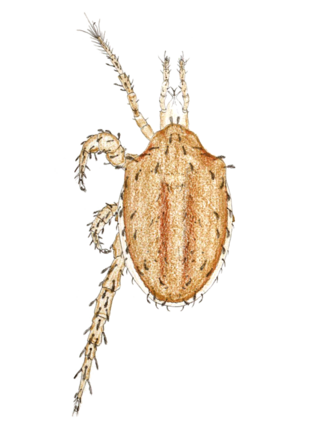
Mesostigmata is an order of mites belonging to the Parasitiformes. They are by far the largest group of Parasitiformes, with over 8,000 species in 130 families. Mesostigmata includes parasitic as well as free-living and predatory forms. They can be recognized by the single pair of spiracles positioned laterally on the body.

The Laelapidae are a family of mites in the order Mesostigmata. The family is also referred to in the literature as Laelaptidae, which may be the correct spelling.

Dermanyssoidea is a superfamily of mites, including most of the mites which parasitise vertebrates.

Macrochelidae is a family of mites in the order Mesostigmata.
The family Ameroseiidae is one of the three families of mites under the superfamily Ascoidea. There are about 12 genera and more than 130 described species in Ameroseiidae. The family has a worldwide distribution.
Ascidae is a family of mites in the order Mesostigmata.
Antennoseius is a genus of mites in the family Ascidae. As of 2021, it comprised 59 species mostly in subgenera Antennoseius and Vitzthumia, as well as six species not assigned to a subgenus.
Blattisocius aegypticus is a species of mites in the family Blattisociidae.
Blattisocius apis is a species of mites in the family Blattisociidae.
Blattisocius apisassociae is a species of mites in the family Blattisociidae.
Blattisocius capsicum is a species of mites in the family Blattisociidae.
Blattisocius daci is a species of mites in the family Blattisociidae.

Blattisocius dentriticus is a species of mites in the family Blattisociidae. It was described by Berlese in 1918.
Blattisocius incisus is a species of mites in the family Blattisociidae.
Blattisocius keegani is a species of mites in the family Blattisociidae. It was described by Fox in 1947.
Blattisocius othreisae is a species of mites in the family Blattisociidae.
Blattisocius quadridentatus is a species of mites in the family Blattisociidae.
Blattisocius tarsalis is a species of mites in the family Blattisociidae. It was described by Berlese in 1918.

Blattisociidae is a family of mites in the order Mesostigmata.
Melicharidae is a family of mites in the order Mesostigmata.





